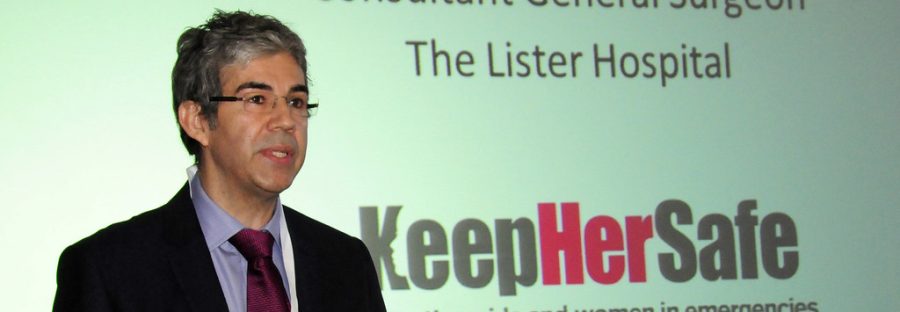Trauma surgeon says mental health issues in west are slight compared with war zone trauma
- Dr David Knott gave a talk at the RNCM
- Trauma surgoen has operated in war zones since 1993
- Compares mental health concerns in the west with war zones
Dr David Nott has spent the last 25 years travelling to war-torn countries helping those in dire need of medical care.
With the release of a new book, Dr Nott gave a talk in Manchester on his experiences – and why people in the West may need to rethink their idea of what depression is.

Dr Nott has worked as a surgeon in war zones, carrying out life-saving operations on men, women and children without basic medical supplies, with bullets firing and bombs exploding a stone’s throw away.
His first encounter with life as a frontline surgeon came in Sarajevo in 1993, and his most recent deployment was in war-ravaged Syria.
Nott opened his talk, David Nott: War Doctor, at the RNCM, describing his first time operating in a hospital that had been nicknamed ‘Swiss cheese’ because of the numerous holes that had been blown into it.
The building shook, the generator failed, and Nott felt the 16 year old boy die while his hands were in his abdomen.
The experience did not deter him however. Instead, it encouraged him to improve his skills and save as many other people as he could.
Fast forward 23 years and Dr Nott found himself amid one of the biggest humanitarian crises in reecnt history: the Syrian civil war.
When he is not operating to save lives, Dr Nott goes above and beyond medical care, even managing to convince President Assad that instead of killing, he should evacuate the 125,500 people trapped in eastern Aleppo during the siege in 2016.
His latest book, War Doctor: Surgery on the Frontline, focuses on the horrors he has witnessed.
For example, he was called on to treat a family of seven brought into his care after a barrel bomb exploded. He treated a boy of five whose buttocks and thighs had been blown off in the explosion and whose face was covered in his sister’s flesh.
Sadly, they had run out of morphine and the only comfort they could provide was to stroke his hair. He died 20 minutes later.
Nottdescribed the situation in war zones as “shocking” in comparison to the first world and wondered why many people are on anti-depressants. He acknowledged that western society has its own pressures caused by the advent of social media but contrasts this with the horrors he has experienced.
He said: “People think they are depressed but they have not been to the worst possible place in the world to realise they are not depressed really.
“Really, your life is not as bad as you think it is.”
According to Time-to-Change, one in four people will suffer with a mental health problem this year. Mental Health Charity, Mind, says that depression can be caused by any number of causes, including, childhood experiences, life events, other mental health problems, physical health problems, genetic inheritance, medication, sleep, diet and exercise.
As the UK has become more prominent at dealing with the above mentioned mental health problems, The Royal College for Psychiatrists has been examining how to adapt UK-based mental health skills to suit working with Syrian Refugees.
Dr Nott detailed his own PTSD-induced psychosis, recalling an incident on his return from one of his tours. One episode left him in the foetal position on a family holiday. Convinced his wife was a jailer, he did not allow her to leave the hotel room.
His wife, Elly, dragged him to the psychiatrist and encouraged him to seek help. His PTSD, which includes flashbacks, aggression and a fear so strong psychosis develops, is “minor” compared to the people caught up in conflict around the world
Dr Nott pointed to the lack of psychiatric care in Syria, something his foundation, a charity which aims to provide surgeons and doctors with the skills they need to save patients in war zones, is working to help eradicate.


